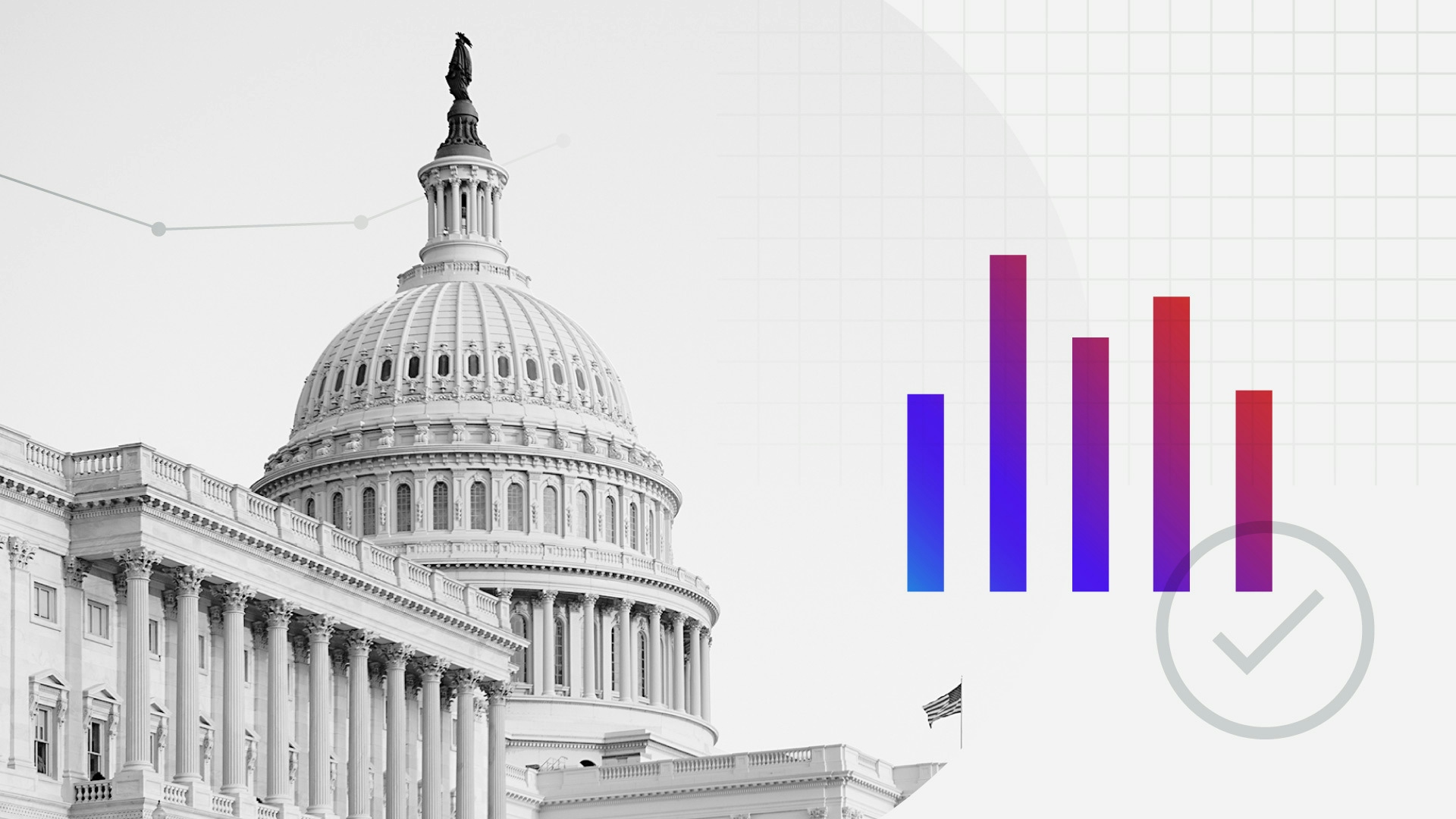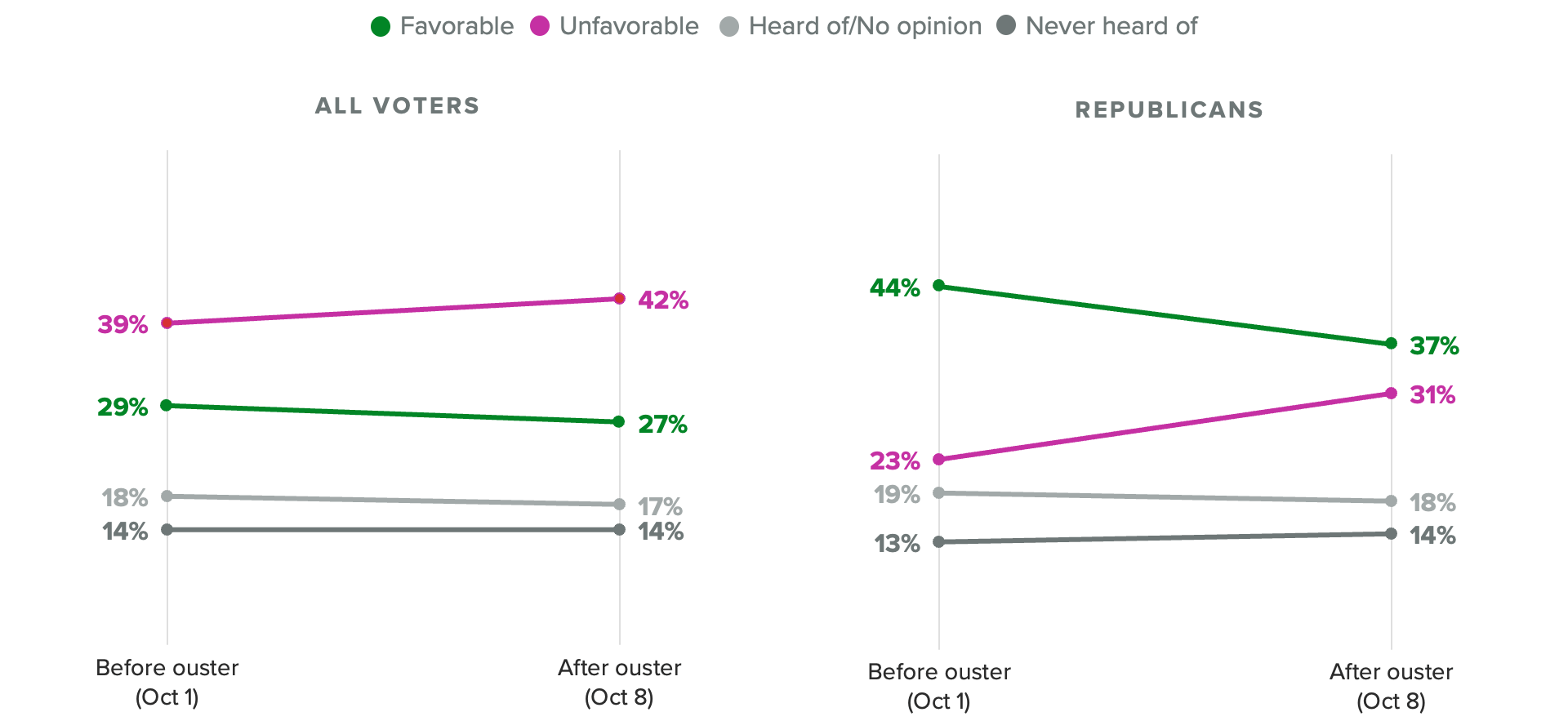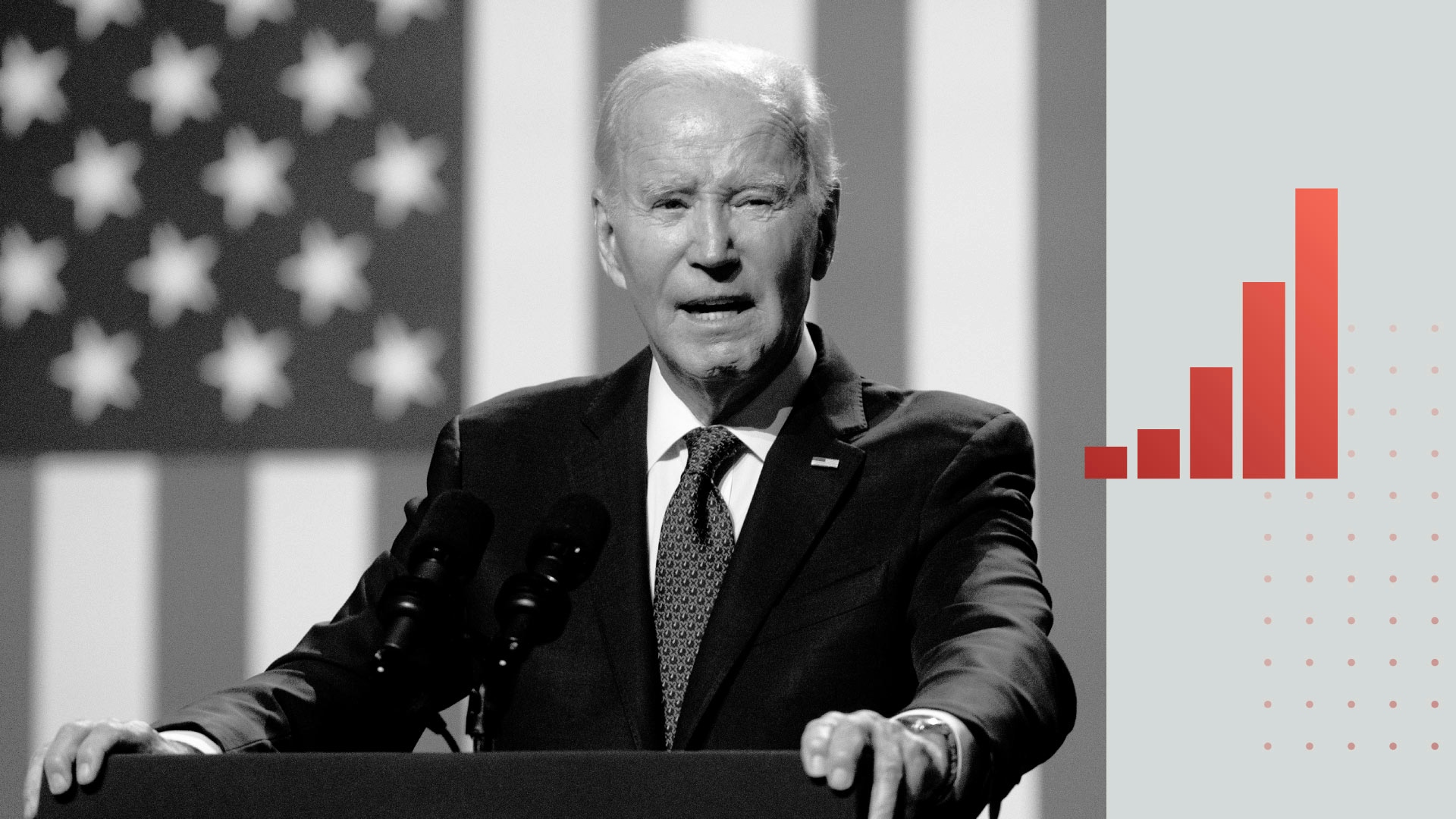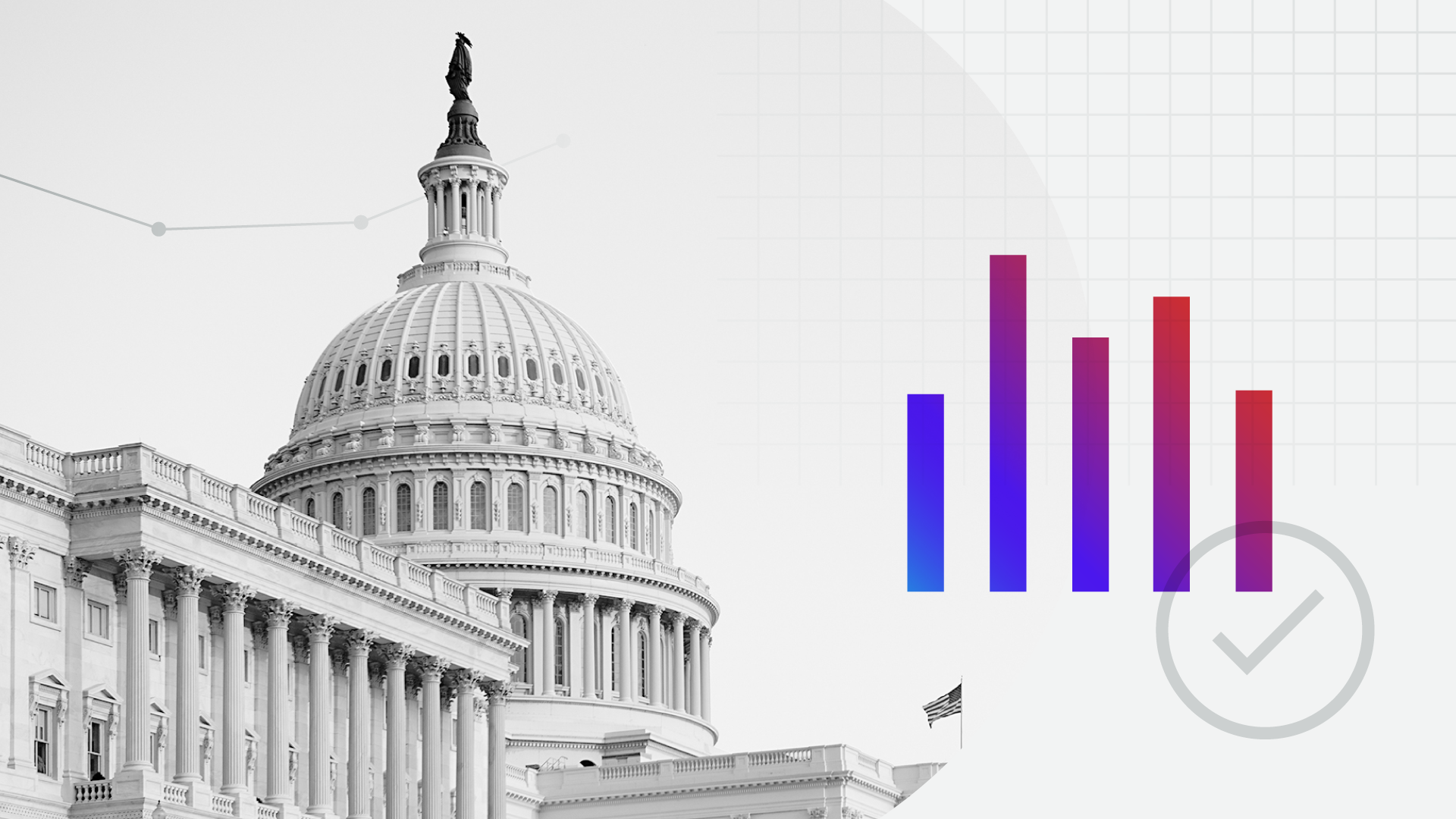GOP Voters Are Split Over Whether Speaker Should Compromise To Prevent a Government Shutdown

Key Takeaways
According to our data collected Oct. 6-8, 41% of Republican voters think it’s more important for the future speaker of the House to stick to the party’s principles even if it means shutting down the government, while 43% say the House’s next leader should make concessions in order to keep the government open.
Two in 5 voters approve of the House’s ousting of Kevin McCarthy as speaker, while about a third oppose the move and roughly 1 in 4 have no opinion about it. Democratic voters are much more likely to support McCarthy’s ouster than Republicans, who are almost evenly divided on the question.
Over 3 in 5 voters have at least heard of speakership candidates Jim Jordan and Steve Scalise, in line with voter awareness of McCarthy before he took the gavel in January. Both potential successors would start out with less dissent among their party’s national electorate, but Jordan is more popular among Republican voters.
Sign up to get the latest data and analysis on how business, politics and economics intersect around the world.
The right-wing-led ouster of Rep. Kevin McCarthy (R-Calif.) as speaker of the House has left the Republican Party grappling with a domestic governance crisis amid two global crises — wars in Ukraine and Israel — that are begging for Washington’s attention and money. And they are all happening as Congress faces another quickly ticking government funding clock, raising again the prospect of a federal shutdown.
Our new survey shows the Republican Party’s base isn’t highly aware of the two current front-runners for House speaker — House Majority Leader Steve Scalise (R-La.) and House Judiciary Committee Chairman Jim Jordan (R-Ohio) — and that a good chunk of the GOP electorate isn’t afraid of a shutdown, which could embolden some Republicans on Capitol Hill to continue to jam the gears of government.
Republican Voters Are Divided Over Compromising to Avert a Government Shutdown
According to our data collected Oct. 6-8, 41% of Republican voters think it’s more important for the speaker of the House to stick to their party’s principles, even if it means shutting down the government. That figure is only slightly lower than the 43% who said the House’s next leader should compromise in order to keep the government open.
Specific demographics at scale: Surveying thousands of consumers around the world every day powers our ability to examine and analyze perceptions and habits of more specific demographics at scale, like those featured here.
Why it matters: Leaders need a better understanding of their audiences when making key decisions. Our comprehensive approach to understanding audience profiles complements the “who” of demographics and the “what” of behavioral data with critical insights and analysis on the “why.”
The GOP’s division on this question contrasts with the overall electorate, which is more than twice as likely to prefer compromise over sticking to the party’s principles (58% to 26%), including similar numbers among independents.
The government funding issue helped torpedo McCarthy’s reign — or at least gave his dissenters fuel against him — and it will likely weigh on whomever the Republican Party elevates to replace him. Our data also shows that this question is more front and center for voters than the future of House leadership more generally.
McCarthy’s Ouster Is More Popular With Democrats than Republicans
Roughly 1 in 4 voters said they have no opinion when asked if they approve or disapprove of the House’s decision to vacate the speaker’s chair, while 2 in 5 support it and around a third oppose it. Democratic voters are more likely to support McCarthy’s ouster than Republicans, who are almost evenly divided on the question.
How voters feel about GOP leaders
Other data points reveal meager interest in McCarthy’s situation among the overall electorate, illustrating that the speaker’s fight is a far more insular matter than it might feel to those in Washington. Only about a third of voters (34%) said they had seen, read or heard a lot about the issue that dominated the headlines out of Washington just before Hamas’ attack on Israel. Awareness of McCarthy went unchanged in the days after his removal and following the attack, with 86% saying they had at least heard of the now-former speaker.
McCarthy Is No More Famous Following Speaker Ouster

While some have floated McCarthy’s return as speaker, his ouster did dampen his standing among Republican voters. His favorability rating dropped 7 points (from 44% to 37%), while the share with unfavorable views increased by 8 points (from 23% to 31%) over the course of a week.
Compared with McCarthy, voters are far less aware of his two potential successors, though Jordan — a favorite on the conservative media airwaves — is slightly more popular among Republicans.
Jordan Is Better Known — and More Popular — Than Scalise With the GOP’s Base
Just over 3 in 5 voters have at least heard of Jordan and Scalise, with awareness at similar levels among Republican voters. This is in line with voters’ awareness of McCarthy before he took the gavel in January, though both potential successors would start out with less dissent among their party’s voters nationwide.
The bottom line
The speaker’s fight has yet to tarnish the Republican Party’s recent improvements in regards to public opinion concerning its ability to govern or tackle the big issues facing the country because relatively few voters have tuned in to the Washington-centric drama.
Any prolonged fight over the speakership could attract more attention to the matter and put those gains to the test. But the bigger challenge for whoever claims the gavel will be finding a workable solution to avoid a government shutdown and keep the speakership. This will pit them against the wishes of a sizable chunk of the party’s base and the larger electorate, suggesting continued brinkmanship from a chamber that controls a third of political power in Washington.
Eli Yokley is Morning Consult’s U.S. politics analyst. Eli joined Morning Consult in 2016 from Roll Call, where he reported on House and Senate campaigns after five years of covering state-level politics in the Show Me State while studying at the University of Missouri in Columbia, including contributions to The New York Times, Politico and The Daily Beast. Follow him on Twitter @eyokley. Interested in connecting with Eli to discuss his analysis or for a media engagement or speaking opportunity? Email [email protected].
Related content

Democrats, Independents Are Less Supportive of House’s Biden Impeachment Inquiry

1 in 3 Voters Would Blame Congressional Republicans for a Shutdown
